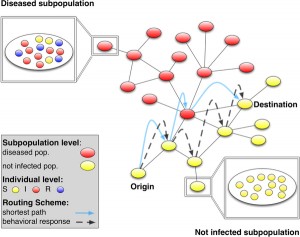Beware the aware

The dynamics of disease spreading
It is traditionally believed that a more informed population about the risks of a pandemics is the best weapon against the contagion. Well, it turns out that is not always the case. A new research paper appearing on Scientific Report shows that well-informed travelers, avoiding regions with the highest rates of infection, actually help the pandemics in finding the pathway to hit new populations. As the authors point out,
This constitutes a very interesting finding, as one can think of the whole process in terms of a social dilemma; individuals adopt a sort of selfish behavior by avoiding highly infected spots, but as a consequence, the disease invades a larger fraction of the subpopulations in the metapopulation system. Thus, what is beneficial at the individual level, turns out to have a negative impact on the whole population, especially in the cases where the epidemic has pervaded the system.
The research, based on real travelers’ data, has been performed by the group led by Alessandro Vespignani of Indiana University, one of the most prominent scientist in the interdisciplinary field of Complex Network theory. In particular, he has explored the peculiar characteristics of epidemic spreading in realistic models of social networks, showing that in such systems a disease can invade the whole population even if the initial fraction of infected individuals is tiny. The same mechanism is at the origin of the counter-intuitive phenomenon described in the Scientific Reports article.
Events
- 16 Feb 12 - London - The Second London Citizen Cyberscience Summit
- 9 Jun 12 - Roma - SeGiochiFaiScienza
- 29 Oct 12 - Bologna - Smart City Exhibition
- 20 Mar 13 - Kassel - EveryAware Meeting - Kassel, 20-22th March 2013
Recent Comments
- Tania Hayes on Documentation for Air Ambassadors
- p.gravino on Air-quality
- latha bhaskaran on Air-quality
- alfred on Air-quality
- Jessica_P on EveryAware at CeBIT 2014
Tag Cloud
AirProbe International Challenge APIC Antwerp APIC Kassel APIC London APIC Turin awareness brussels CeBIT citizen science crowdsourcing crowdsourcing data validation environment EU events everyaware extreme citizen science fair Fukushima games geographical information geospatial information Germany Google Hannover health indignad@s internet internet and societies Marian Steinbach mobility muki haklay naples nuclear energy occupywallst openstreetmap opinion dynamics opinions paradiso participatory sensing press release publication publications radioactivity societies state of the map sustainability swiftriver UCL Uncategorized ushahidi waste webCategories







